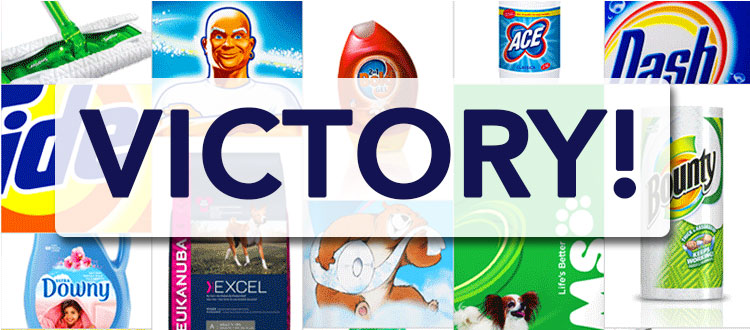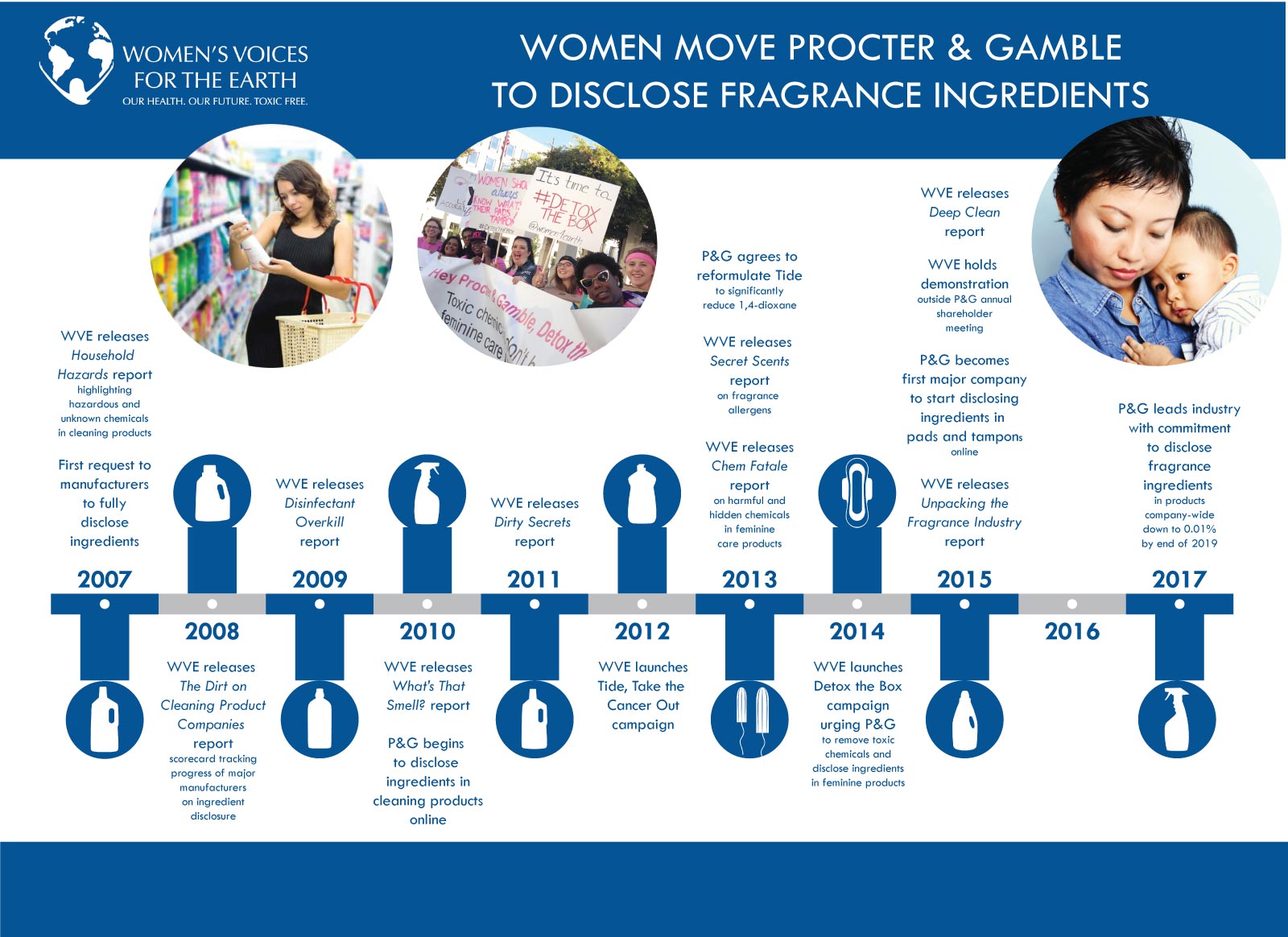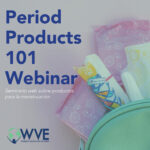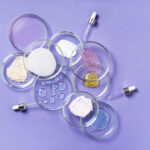VICTORY! Women Move Procter and Gamble to Disclose Fragrance Ingredients
 |
| Sarada Tangirala Director of Corporate Accountability |
I’m so excited to bring you this news: today Procter & Gamble announced it will disclose fragrance ingredients in all of their products!
Thousands of synthetic chemicals are used to create modern day fragrances for everyday products from tampons to detergent. For decades, manufacturers have kept fragrance ingredients — even those linked to allergies and other serious health issues like cancer and birth defects — a secret from their customers. This move by Procter and Gamble solidifies the notion that keeping ingredients a secret from consumers is simply not acceptable anymore – not in personal care products, not in cleaning products, not anywhere!
This announcement also makes it clear that disclosing fragrance ingredients is in fact do-able – something that many companies have long denied. Just a few short years ago, our conversations with manufacturers almost always led to the same conclusion – discussing fragrance ingredient disclosure was simply off the table – because the fragrance houses wouldn’t allow them to give up their “secrets”.
You have never stopped pushing major companies to disclose fragrance ingredients and, because of this, we have been seeing a steady trickle of steps toward this in the last few years. For example, earlier this year, Unilever took a BIG step and announced it would disclosure fragrance ingredients in their personal care products. Some major cleaning companies, like Clorox and RB, have made strides by disclosing fragrance allergens in their products. While SC Johnson was the first major company of any kind to disclose the majority of their fragrance ingredients online.
A few highlights along this disclosure road:
- You first blew the whistle on toxic chemicals in cleaning products in 2007. Back then, all the major companies kept ingredients secret from their customers, but the tide started to turn.
- With continued pressure, companies like P&G started to list cleaning product ingredients online, but fragrance was still a “black box,” and claimed a trade secret protection.
- You wouldn’t take “trade secrets” for an answer, so we published “Secret Scents,” detailing how women are disproportionately impacted by exposure to fragrance allergens. The report highlighted how the European Union was already taking action on fragrance allergens, and we demanded that companies in the United States can and should do the same.
- With the Detox the Box campaign, launched in 2014, women demanded to know what’s in popular feminine care brands Always and Tampax. The music video went viral. When product testing revealed that Always pads contained carcinogens and reproductive toxins, you stepped up pressure on P&G to take our concerns seriously. And in 2015, P&G started disclosing ingredients in pads and tampons.
- Through relentless investigation and ongoing dialogue with P&G, we continued to urge them to reveal fragrance secrets. This announcement is a massive victory for women’s health, and our work continues to ensure that products are safe.
This victory is thanks to YOU. You took action and raised your voice for ingredient transparency. Women stood together, demanded your right to know, and moved the biggest consumer products company in the world to respond to your demands!








What other companies need to disclose their Fragrance Ingredients? Have shareholder resolutions been filed?
Congratulations! And I suggest a thank you to them we can all sign. That will show support to them for what they did. Reinforce it too. Be an example for other companies too.
Besides the Swiffer Unscented dust cloths for the swiffer or Swiffer Vaccum. Those cloths have a mild fragrance/scent now. What else does Proctor and Gamble NoT label accurately? From what I can see all of there other products say there is a fragrance If there truly is. And what that fragrance smells like if there is a strong recognizable fragrance.
HI James – The major companies that have committed to (or are already) disclosing fragrance ingredients thus far are P&G, Unilever and SC Johnson. There are numerous small companies that are also already disclosing their fragrance ingredients. But as far as who still needs to disclose – it is pretty much everyone else making household products. We have not filed any shareholder resolutions on this issue as part of our campaign over the years, and have achieved successes thus far without going that route. But given the momentum that fragrance disclosure has now, it is an interesting strategy to consider for the future.
“Congratulations! And I suggest a thank you to them we can all sign. That will show support to them for what they did. Reinforce it too. Be an example for other companies too.” — Great idea Greeley! Let me talk with the team!
Hi AJLVDT — When you see the term “fragrance” (or perfume, parfum) on an ingredient label, this term actually represents a chemical cocktail that can be made up of hundreds of ingredients. And this is particular a problem be cause we know that a number of chemicals that are used to make up fragrances are toxic (for more information about this – please take a look here: https://womensvoices.org/2015/12/10/toxic-chemicals-found-in-fragrance/). So instead of this blanket term, all of those ingredients that are used to make a fragrance will now be available and women and men can make informed decision about their health.
People won’t care either way. They don’t read labels and they are addicted to these scented products. The label would have to carry a “potential carcinogen” or prop 65 label to get people’s attention. People must be educated that anything synthetically scented is chemical derived, and therefore, should not be purchased. Even essential oils, unless organic, are made with a chemical process. The bottom line is we need to get these companies to stop making toxic products. Period. A list of chemicals on the label won’t change anything. If it did, people wouldn’t buy handsoap, toothpaste, etc., where there are already chemicals listed on these products. Does this make sense to anyone?
Hi John – I understand your frustration, and this certainly isn’t the end of ensuring companies stop putting toxic chemicals into their products. We’ve actually heard a lot of what you said from companies for years as to why they don’t need to disclose: People don’t care. People don’t read labels. People can’t understand chemicals away…“Don’t worry, trust us when we tell you our products are safe; who cares if our definition of safe differs from yours” … But that simply isn’t true. People do care – people do read labels and avoid specific chemicals when they have proper information. People do want safer products. This is victory on a number of levels – it shows that companies (even the big players like P&G) are changing based on the demands of consumers; and that with transparency people can now benchmark products which will help push the market toward safer products as more and more women and men choose products that don’t contain harmful chemicals. Without ingredient disclosure there is very little incentive for companies to make safer products.
Absolutely, there is more work ahead, but a lot of that work wouldn’t be possible without full transparency of ingredients. And absolutely, educating people about the dangers of toxic chemicals in products is a HUGE part of the solution, paired with relentless pressure on companies, government and decision-makers to put an end to the toxic assault on public health. That’s where you and I and countless others come into play… because remember — especially when you get particularly frustrated — you care about safer products, countless people care about safer products, and care about ending this toxic assault. You’re not alone and together we can create real positive and impactful change. It’s not easy, but we’re not giving up until we see that happen — and we know people like you feel the same way.
Mi nombre es Araceli Herrera, vegonde de un país donde estudie el Colegio. Aprendi de quimica y biologuia. Cuando llegena esté país y por mis condición migratoria !tuve que hacer trabajó doméstico. Y yo sí leía las Etiquetas de los productos de limpieza. Me horrorize de su contenido! Me protegía en cada trabajó pedía usar los productos menos toxicos a cada casa qué llege a limpiar. Hoy empeze talleres para enseña r a las trabajadoras del hogar a hacer sus propios productos no tóxicos. doy talleres. “AROMAS DELICIOSOS, USOS PELIGROSOS”. Gracias por su lucha.
domesticasunidas12@gmail.com. Domesticas Unidas en FB. 1606 Fulton Av., San Antonio Tx., 78201, Local # de Tel. 210 468 2004 , a sus órdenes. Yo ya tengo fórmulas para hacer el producto en You tuub.
Yo pienso que las que mas dañamos el ambiente somos las amas de casa y las trabajadoras qué limpian en los hogares. Comuníquese conmigo. La UTSA de San Antonio esta haciendo un estudió a trabajadores del hogar de nuestra Organización. Muchas de mis amigas que usábamos a diario el Bus. Murieron muy jovenes y todas de Cancer. Estamos ennla encuesta. De estos Productos. Me dio un enorme gustó saber que hay mucha gente luchando en contra de esas Compañias asesinas.
I would love to see clearly on the product : “contains fragrance/parfum” for regular products that are not advertised as scented. I used a “24 hour moisturizer” that i realized after multiple headaches had “fragrance” after i read the label. Now i only use Aveeno.